Top Rankings
Seaford School District ranks among the top 20% of public school district in Delaware for:
Category
Attribute
Diversity
Most diverse schools (Top 1%)
For the 2025 school year, there are 2 public middle schools serving 878 students in Seaford School District. This district's average middle testing ranking is 4/10, which is in the bottom 50% of public middle schools in Delaware.
Public Middle Schools in Seaford School District have an average math proficiency score of 19% (versus the Delaware public middle school average of 27%), and reading proficiency score of 34% (versus the 43% statewide average).
Minority enrollment is 73% of the student body (majority Black), which is more than the Delaware public middle school average of 63% (majority Black).
Overview
This School District
This State (DE)
# Schools
7 Schools
75 Schools
# Students
3,417 Students
51,514 Students
# Teachers
217 Teachers
3,541 Teachers
Student : Teacher Ratio
15:1
15:1
District Rank
Seaford School District, which is ranked within the top 50% of all 42 school districts in Delaware (based off of combined math and reading proficiency testing data) for the 2021-2022 school year.
The school district's graduation rate of 70-74% has decreased from 75-79% over five school years.
Overall District Rank
#17 out of 42 school districts
(Top 50%)
(Top 50%)
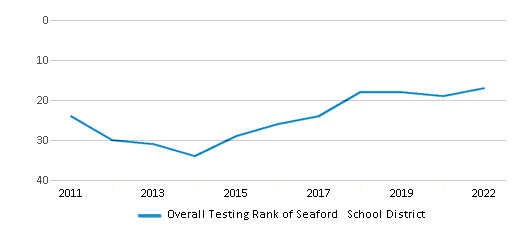
Math Test Scores (% Proficient)
30%
29%
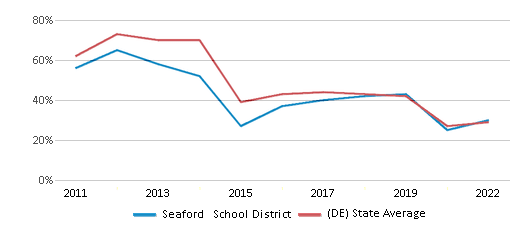
Reading/Language Arts Test Scores (% Proficient)
40%
42%
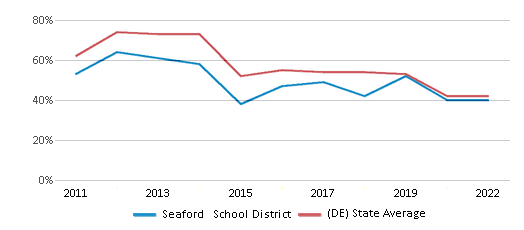
Science Test Scores (% Proficient)
13%
21%
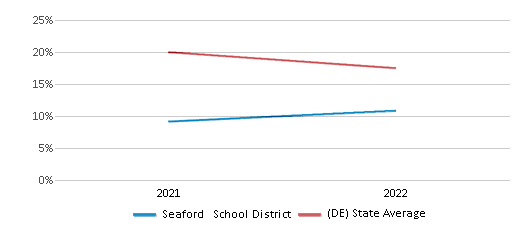
Graduation Rate
70-74%
88%
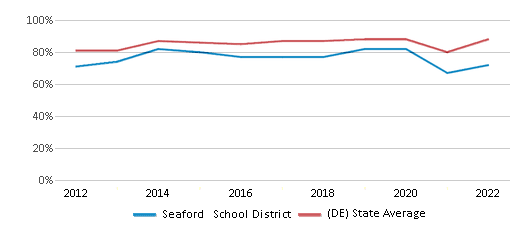
Students by Ethnicity:
Diversity Score
0.72
0.72
# American Indian Students
11 Students
188 Students
% American Indian Students
n/a
n/a
# Asian Students
29 Students
2,640 Students
% Asian Students
1%
5%
# Hispanic Students
991 Students
9,902 Students
% Hispanic Students
29%
19%
# Black Students
1,223 Students
16,889 Students
% Black Students
36%
33%
# White Students
921 Students
19,260 Students
% White Students
27%
38%
# Hawaiian Students
2 Students
60 Students
% Hawaiian Students
n/a
n/a
# Two or more races Students
240 Students
2,575 Students
% of Two or more races Students
7%
5%
Students by Grade:
# Students in PK Grade:
45
367
# Students in K Grade:
290
1,611
# Students in 1st Grade:
272
1,804
# Students in 2nd Grade:
280
1,861
# Students in 3rd Grade:
273
1,779
# Students in 4th Grade:
285
1,749
# Students in 5th Grade:
289
1,937
# Students in 6th Grade:
269
9,997
# Students in 7th Grade:
267
10,869
# Students in 8th Grade:
288
11,046
# Students in 9th Grade:
271
2,442
# Students in 10th Grade:
230
2,101
# Students in 11th Grade:
190
1,955
# Students in 12th Grade:
168
1,996
# Ungraded Students:
-
-
District Revenue and Spending
The revenue/student of $16,369 in this school district is less than the state median of $20,321. The school district revenue/student has declined by 5% over four school years.
The school district's spending/student of $15,244 is less than the state median of $18,401. The school district spending/student has declined by 5% over four school years.
Total Revenue
$56 MM
$2,882 MM
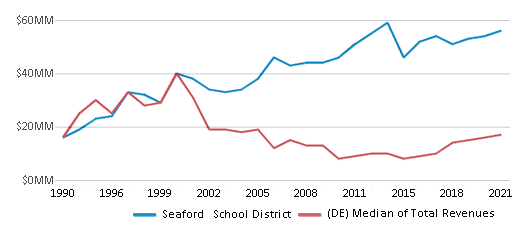
Spending
$52 MM
$2,610 MM
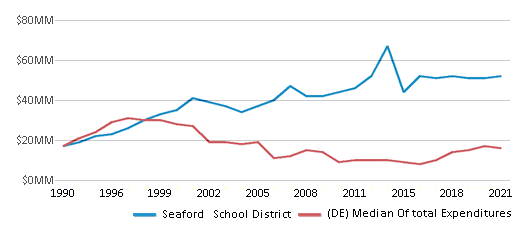
Revenue / Student
$16,369
$20,321
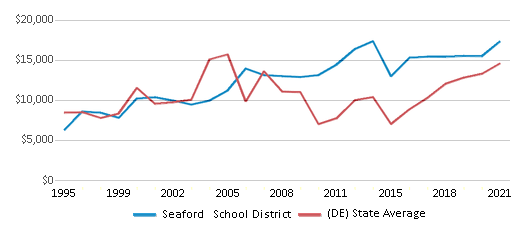
Spending / Student
$15,244
$18,401
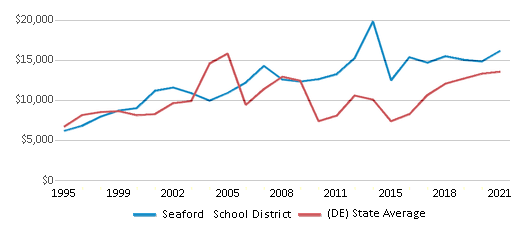
Best Seaford School District Public Middle Schools (2025)
School
(Math and Reading Proficiency)
(Math and Reading Proficiency)
Location
Grades
Students
Rank: #11.
Seaford Middle School
(Math: 19% | Reading: 34%)
Rank:
Rank:
4/
Bottom 50%10
500 East Stein Highway
Seaford, DE 19973
(302) 629-4587
Seaford, DE 19973
(302) 629-4587
Grades: 6-8
| 812 students
Rank: n/an/a
Sussex Orthopedic Program
Special Education School
One Delaware Place
Seaford, DE 19973
(302) 629-4587
Seaford, DE 19973
(302) 629-4587
Grades: PK-12
| 66 students
Recent Articles

Sexual Harassment at Age 6: The Tale of a First Grade Suspension
A six-year old in Aurora, Colorado, was suspended after singing an LMFAO song to a little girl in his class and reportedly “shaking his booty.” We look at the case and the sexual harassment problem in public schools today.

How Scaffolding Could Change the Way Your Child Learns
This article explores the concept of instructional scaffolding, a teaching method that enhances learning by breaking down complex tasks into manageable parts. It highlights how scaffolding supports students in developing critical thinking skills and becoming more independent learners. The article discusses the benefits of scaffolding, including improved engagement and reduced anxiety, and provides strategies for its implementation across various educational levels.

February 05, 2025
Understanding the U.S. Department of Education: Structure, Impact, and EvolutionWe explore how the Department of Education shapes American education, from its cabinet-level leadership to its impact on millions of students, written for general audiences seeking clarity on this vital institution.





